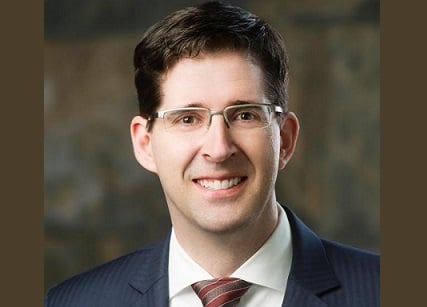In life and in finance, an early start can work in your favour – which is a lesson Dave Lee knows well

It’s difficult to say whether anyone is destined to be part of the investment industry. The best that can be said, especially among advisors who work on numbers and mathematical models, is that some are primed toward that direction by a confluence of factors. And that seemed to be the case for Dave Lee.
“My father was in life insurance, so I had some early exposure to the industry,” said the wealth advisor at Scotia Wealth Management. “I also enjoyed math and grew up in a time when double-digit interest rates were normal. My father had a booklet that showed how different interest rates affected how much money was earned or paid at varying rates and time frames. This introduced me to the idea of compound interest and changed the way I thought about money — it snowballed for you or against you, depending on whether you were saving or borrowing.”
With this new outlook, Lee realized the importance of an early start, and he acted on the knowledge almost immediately.
“I got a paper route, sold newspaper subscriptions and went door-to-door with catalogues for Regal Greetings and Gifts. By the time I was 12, I was investing my savings in the markets with my father’s help. That was 1987, so I suspect I’m one of the youngest Canadians to have lost money in the crash on October 19, 1987. Though disappointed by my loss, I now view the experience as tuition for entry into the financial industry.”
Certainly, losing money in the markets can be painful. But that wasn’t the only challenge that would befall Lee. “It was also around this time that my father had a car accident, which ended his career. We were a one-income family, so the impact was profound,” he said. “Fortunately, my father had an accident insurance policy, which took care of much of the mortgage, and my part-time jobs helped pay for my clothes, my first car and much of my university education.”
It wasn’t long before Lee started investing in mutual funds offered by a local bank. He read everything he could get his hands on about investing, including a book by Warren Buffett and the complete mutual fund prospectuses offered by the bank’s sales reps. By the time he was a teenager, he had already established his own active and passive income streams. With that hands-on financial experience, as well as his cover-to-cover perusals of investment-related material, he started to consider a career as an advisor.
“I thought, ‘Maybe one day I’ll be able to advise people on their investments, but only if I build out my experience first.’ I spent another decade investing my own money, earning a master’s degree, and obtaining advanced investment and financial planning credentials before entering the wealth management profession.”
Gradually, he met the necessary requirements to enter the financial field. He went on to acquire a portfolio of credentials, including the Chartered Investment Manager and Certified Financial Planner designations. Armed with both direct experience and formal qualifications, he now enjoys the chance to provide people with a much-needed education on their money and how it’s supposed to work.
“For many people, investments seem confusing and financial jargon is a foreign language. They just hope things somehow work out in the end,” he said. “It’s my job to clear the financial fog.
“I like to make sure my clients understand what we’re doing and why,” he continued. “For both them and me, that takes time and patience. But when clients tell me that, after decades of investing, they finally ‘get it,’ I feel great. Clients leave my office with clarity… That’s life-changing.”
Given his drive to provide clients with clarity, it’s no surprise that Lee supports recent moves to increase transparency – and actually would like more to be done.
“I like the increased transparency on the cost of investing, but I’m not sure it goes far enough. At the very least, the current rules are a work in progress.”
The current rules may need improvement, but the ideal condition doesn’t come immediately from just a single push. That’s true for regulatory policy, and for Lee, the same holds for professional success.
“It’s intriguing to think of success as something attributable to one decision, one choice or one secret,” he said. “But the truth is more mundane. Success is the predictable, eventual result of hard work, dedication and discipline.”
As for his peers in the industry, Dave has the following advice to offer:
“Keep learning so you can provide the highest level of knowledge and advice possible to your clients. Top-notch service is important, but service is hollow if it’s not backed by sufficient expertise.”
Related stories:
Turning trust into a trademark
From curiosity to mastery: a portfolio manager’s journey
“My father was in life insurance, so I had some early exposure to the industry,” said the wealth advisor at Scotia Wealth Management. “I also enjoyed math and grew up in a time when double-digit interest rates were normal. My father had a booklet that showed how different interest rates affected how much money was earned or paid at varying rates and time frames. This introduced me to the idea of compound interest and changed the way I thought about money — it snowballed for you or against you, depending on whether you were saving or borrowing.”
With this new outlook, Lee realized the importance of an early start, and he acted on the knowledge almost immediately.
“I got a paper route, sold newspaper subscriptions and went door-to-door with catalogues for Regal Greetings and Gifts. By the time I was 12, I was investing my savings in the markets with my father’s help. That was 1987, so I suspect I’m one of the youngest Canadians to have lost money in the crash on October 19, 1987. Though disappointed by my loss, I now view the experience as tuition for entry into the financial industry.”
Certainly, losing money in the markets can be painful. But that wasn’t the only challenge that would befall Lee. “It was also around this time that my father had a car accident, which ended his career. We were a one-income family, so the impact was profound,” he said. “Fortunately, my father had an accident insurance policy, which took care of much of the mortgage, and my part-time jobs helped pay for my clothes, my first car and much of my university education.”
It wasn’t long before Lee started investing in mutual funds offered by a local bank. He read everything he could get his hands on about investing, including a book by Warren Buffett and the complete mutual fund prospectuses offered by the bank’s sales reps. By the time he was a teenager, he had already established his own active and passive income streams. With that hands-on financial experience, as well as his cover-to-cover perusals of investment-related material, he started to consider a career as an advisor.
“I thought, ‘Maybe one day I’ll be able to advise people on their investments, but only if I build out my experience first.’ I spent another decade investing my own money, earning a master’s degree, and obtaining advanced investment and financial planning credentials before entering the wealth management profession.”
Gradually, he met the necessary requirements to enter the financial field. He went on to acquire a portfolio of credentials, including the Chartered Investment Manager and Certified Financial Planner designations. Armed with both direct experience and formal qualifications, he now enjoys the chance to provide people with a much-needed education on their money and how it’s supposed to work.
“For many people, investments seem confusing and financial jargon is a foreign language. They just hope things somehow work out in the end,” he said. “It’s my job to clear the financial fog.
“I like to make sure my clients understand what we’re doing and why,” he continued. “For both them and me, that takes time and patience. But when clients tell me that, after decades of investing, they finally ‘get it,’ I feel great. Clients leave my office with clarity… That’s life-changing.”
Given his drive to provide clients with clarity, it’s no surprise that Lee supports recent moves to increase transparency – and actually would like more to be done.
“I like the increased transparency on the cost of investing, but I’m not sure it goes far enough. At the very least, the current rules are a work in progress.”
The current rules may need improvement, but the ideal condition doesn’t come immediately from just a single push. That’s true for regulatory policy, and for Lee, the same holds for professional success.
“It’s intriguing to think of success as something attributable to one decision, one choice or one secret,” he said. “But the truth is more mundane. Success is the predictable, eventual result of hard work, dedication and discipline.”
As for his peers in the industry, Dave has the following advice to offer:
“Keep learning so you can provide the highest level of knowledge and advice possible to your clients. Top-notch service is important, but service is hollow if it’s not backed by sufficient expertise.”
Related stories:
Turning trust into a trademark
From curiosity to mastery: a portfolio manager’s journey


